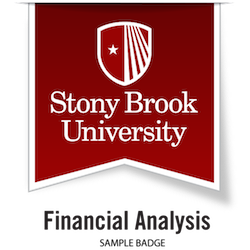ADDING VALUE FOR BOTH STUDENTS AND RECRUITERS
“I found that badging often applies to the soft skills that aren’t always valued by a traditional grading system in a traditional course,” believes Richmond Pope. “I think that displaying a badge really allows you to learn more about that person and it may even be what opens the door to a recruiter learning more about someone.”
The badge movement is still in its infancy stage at business schools, but that will likely change in the next few years with the emergence of new open learning management systems that will give schools the tools and resources needed to easily design and tailor badges specific to their university’s needs, says Daniel Hickey, a professor and program coordinator of Indiana University’s Learning Sciences program, who is directing the Open Badges for Open edX and Beyond project for the MacArthur Foundation. Business schools in particular will be drawn to badges because they will see it as a way to easily add value for both students and recruiters, he said.
“Rankings are primarily about visibility and schools these days invest a lot of money to get name recognition,” Hickey adds. “Badges will be up on LinkedIn and Facebook, recruiters will see them and they will make that school stand out. So we think there is a lot to be said for how badges, especially high-quality ones, will eventually impact things like rankings, which are premised on value.”
KELLEY AND MCCOMBS WILL SOON OFFER DIGITAL BADGES
Hickey and his colleague James Edward Willis, a research associate in the Center for Research on Learning and Technology in the School of Education at Indiana University, have spent the last few months engaged in discussions with a number of business schools interested in launching their own digital badge program, from MBA to undergraduate BBA programs.
For example, the Kelley School at Indiana University is developing an undergraduate electronic portfolio system that will allow students to demonstrate their professional growth across four years of coursework, and is considering using badges to share this information with recruiters and graduate schools, Willis said. On the MBA front, the McCombs School is developing a leadership development roadmap for their MBA students, and will use a digital badging system that will enable students to map, verify and share their work in developing leadership skills, he said.
“What’s exciting about what places like McCombs are doing is finding ways to do this by helping learners recognize that learning isn’t necessarily just what is represented on the transcript,” Willis says.
 FIRST BADGES LINKED TO FOR-CREDIT COURSES
FIRST BADGES LINKED TO FOR-CREDIT COURSES
Another innovator in this space is Stony Brook University in Long Island, which released a “University Badge Catalog” for the first time last year. It lists 17 digital badges graduate students can obtain in the fields of education and business by taking certain combinations of classes. For example, an MBA student looking to earn a university digital badge in investment analysis can do so by taking two graduate-level courses, one in investment analysis and another in portfolio management.
“We are definitely among a handful of pioneers working in this area, and as far as we know are the first academic institution to develop badges that are linked to for-credit courses,” says Kenneth Lindblom, the associate dean for academic programs at Stony Brook University’s School of Professional Development, who is in charge of the digital brand program. “We are trying to elevate the status of the digital badge.”
Lindblom is working closely with Manuel London, dean of Stony Brook’s College of Business, to come up with other ideas for badges attached to the MBA program, and is also in talks with the undergraduate College of Arts & Sciences school to allow undergraduate students to take advantage of badges as well.
So far, the school has issued the university badges to about eight students, but expects to issue dozens more in the coming year as word about the badges spread amongst the student body.
“Students are very happy about it because anything that you can do to really help them professionally exhibit marketable skills, particularly in this economy, is really welcome,” he says.
DON’T MISS: THE TOP TEN BUSINESS MOOCS FROM COURSERA IN 2015 or BEHIND WHARTON’S BIG BOLD BET IN ONLINE LEARNING





Questions about this article? Email us or leave a comment below.